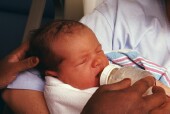
TUESDAY, Feb. 18, 2014 (HealthDay News) — New mothers are less likely to breast-feed their infants if the newborns are given formula while in the hospital, a new study finds.
The researchers included 210 newborns who were exclusively breast-fed while in the hospital, and 183 newborns who received at least some formula. All of the mothers in the study had initially planned to avoid the use of formula while in hospital.
Between the first and second month after they left the hospital, babies who had been given formula in hospital were less likely than babies who had been breast-fed only in hospital to be exclusively breast-fed (one-third of formula group versus two-thirds of breast-fed group).
After two months, 33 percent of the infants in the formula group were not being breast-fed at all, compared with only 10 percent of those who’d been exclusively breast-fed in the hospital, according to the study published online Feb. 14 in The Journal of Pediatrics.
In addition, the more formula that babies received in hospital, the less likely it was that their mothers would continue breast-feeding, the study authors found. This is thought to be the first time a link has been found between the amount of formula given to newborns while in hospital and their mothers’ breast-feeding behavior.
“We are a step closer to showing that giving formula in the hospital can cause problems by reducing how much women breast-feed later,” study author Caroline Chantry, a professor of clinical pediatrics at the University of California, Davis Medical Center, said in a university news release.
“Despite being highly motivated to breast-feed their babies, in-hospital formula use limits this important practice,” she suggested. “Given the benefits of breast-feeding for both mother and baby, this is a public health issue.”
Mothers who fed their babies formula while in the hospital gave a number of reasons for doing so. Many believed they weren’t producing enough milk, while others thought their newborns weren’t getting sufficient nutrition or latching on properly.
“These results underline the importance of providing comprehensive support for women who wish to breast-feed,” Chantry said. “Doctors and nurses must be trained to help, and lactation consultants must be readily available. We need to do more to help mothers overcome breast-feeding obstacles and limit formula use.”
Exclusive breast-feeding is recommended for the first six months of an infant’s life, according to the American Academy of Pediatrics (AAP).
In babies, breast-feeding reduces the risks of problems such as diarrhea, respiratory and urinary tract infections and obesity, the AAP states.
In mothers, breast-feeding reduces postpartum bleeding and promotes earlier return to pre-pregnancy weight, among other benefits, according to the AAP website.
Although the study found an association between use of formula in hospital and lower likelihood of breast-feeding later, it did not prove a cause-and-effect relationship.
More information
The U.S. Office on Women’s Health has more about breast-feeding.
Copyright © 2026 HealthDay. All rights reserved.

